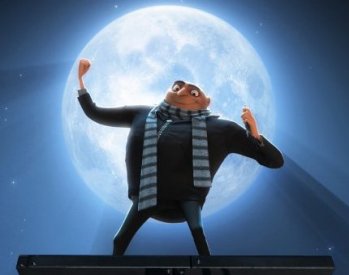Review: Despicable Me

One reason I let my subscription to National Catholic Reporter lapse in 2001 was that they reviewed Shrek. C'mon: Space I would prefer to see covering Catholic issues like Papal authority and women's ordination was spent reviewing cartoon movies of no religious significance. Worse yet, the reviewer just didn't get it. He was furious that Shrek was obviously skewering Disney-style storytelling and assumed that it was indicative of laziness. Dude, that was the idea.
I thought of that review last night when we left the theater after seeing Despicable Me. Shrek changed cartoon movies forever by its wholesale embrace of sly cultural references that shoot right past the kids but make the adults chuckle. A bush that looks like Shirley Bassey? How many eight-year-olds have ever even heard of Shirley Bassey? I was half an hour into Despicable Me when I realized what was wrong: No cultural references. An entire genre of humor was simply missing from the film. (Ok, two turned up later on, but given their rarity I won't spoil either here.)
After recalibrating myself away from the Shrek humor setting, I managed to enjoy the film a great deal more. What we have here is still a sort of sendup, but a much subtler one: of the whole idea of comic-book supervillains. Somewhere looking suspiciously like San Francisco, in an oversized Gothic bungalow, lives Gru the supervillain. He steals things, and competes for supervillain cool points with other supervillains who also steal things. The stakes have been ratcheting up lately, and a younger supervillain across town manages to steal the Great Pyramid of Giza and hide it in his backyard by painting it blue with little white clouds. The glove has been thrown, and vaguely middle-aged Gru knows he is being shown up by an upstart punk in a warm-up suit. Hence his audacious plot to re-seize the high (low?) ground: Steal the Moon! What could be bigger than that?
Everything else builds upon this remarkably silly premise, and the kids all around us in the theater laughed almost continuously. Gru himself is beautifully done, if a little derivative at times. To me he suggested Gomez Adams, especially given the décor of his house, which is replete with iron maidens, cannons, and Viking flails. (Others have pointed out a certain resemblance to the food critic in Ratatouille.) His nerdy younger rival supervillain, Vector, is a lot more high-tech and was clearly intended to channel Bill Gates. Gru has a backstory: He craves his indifferent mother's approval, and has always wanted to go to the Moon. How could he not be a little bit nuts?
Deep under his suburban backyard, Gru has a supervillain hideout and research facility where hundreds of little yellow guys do his heavy lifting and (once the bank won't offer any additional R&D loans) fund his supervillainy. He calls them Minions, and they have both of the essential characteristics of minor cartoon movie characters: They are very cute, and eminently injection-moldable. (They reminded me of squeaky dog toys. But when you have four dogs, a lot of things remind you of squeaky dog toys.)
The real story begins when Gru adopts three orphan girls as part of a plot to steal a reducer-ray from Vector. Although he finds the idea of small children barely tolerable, little girls are like puppies: Once you have them for awhile, it's very hard to give them up. The girls work their magic on Gru and against his will slowly redeem him from supervillainy.
The rest of the action is silly sight gags, Minion antics, and humor targeted squarely at eight-year-olds. The voices (primarily Steve Carell, Jason Segal, and Julie Andrews) were skillfully deployed. I felt that the script could have done a lot more with the rich visual vocabulary offered by the animation, but I'm a writer and I'm hard on movie scripts, especially when I get the sense that the scriptwriters assumed that superb animation would carry the story.
Still, the kids loved it, and that's who it was for. Cynics looking for snarky humor will cringe at the sweetness displayed toward the end, and the (mostly extinct) cynical side of me wondered if the sweetness was tacked on simply for commercial reasons. Doesn't matter; it's not a major classic and shouldn't be compared to things like The Incredibles or Shrek. My inner eight-year-old loved it. (And as soon as I can find one, Dash will be chewing on a squeaky Minion.)
Recommended.